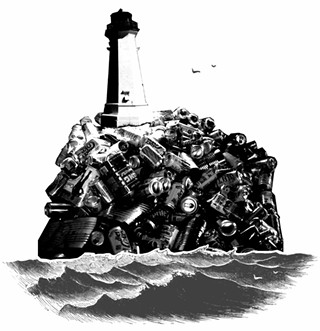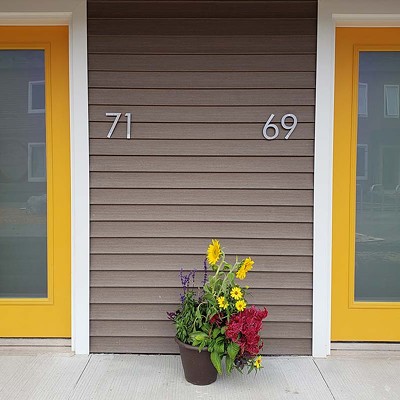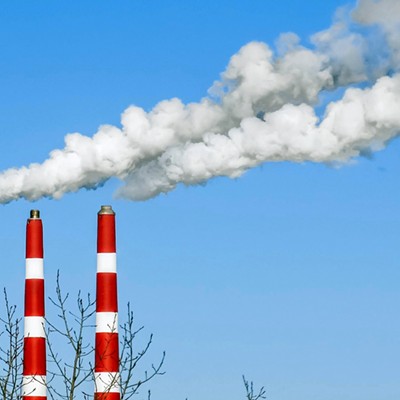Guarding the entrance to Halifax Harbour, McNabs Island hosts impressive and diverse ecosystems, amazing views of the harbour and interesting and complex archaeological sites, including military fortifications, a bottle works and a cholera cemetery.
I had never been there before so I jumped at the opportunity to ferry over with the Friends of McNabs Island for their annual clean-up. The trip began on a positive note: About 50 schoolchildren lined up at the wharf along with the 75 adults who had signed up for the cleanup. Good, I thought, they'll do a little public service and maybe develop a bit of an environmental ethic.
It was also a good thing I was surrounded by such optimistic, nice people (and the Friends of McNabs Island are great people, truly—I've posted more about their work on the Coast blog), otherwise I may not have survived my battle with cynicism.
That battle started on the boat when a representative of Esso, very possibly the most polluting corporation on planet earth, handed out free work gloves. Just doing their part for the environment, you see.
"Eeew!" shouted kids looking over the side as we passed Georges Island. "Toilet paper!" A gift from Halifax's raw sewage outfalls.
Cathy McCarthy, the delightful organizer with FOMI, spoke over a loudspeaker. "Don't let the kids pick up syringes," she said. "But pick up the Tim Hortons cups. We get more Tim Hortons cups than anything else."
On disembarking, we were handed green trashbags stamped with the Tim Hortons logo. Timmy's, too, was doing its part for the environment.
I hiked to Hangmans Beach, passing a blue heron feeding in a marsh and startling a herd of white-tailed deer. On the rocky beach I began picking up mostly plastic crap—oil containers, five-gallon buckets, pop bottles, a set of Disney characters "made in China for Burger King." Oh, and the tampon applicators—hundreds of thousands litter the shore, another gift from the sewage.
Just then a cargo ship passed, carrying hundreds of containers, any one of them holding more plastic crap than we de-litterers could pick up in a century.
Realizing the beach was a hopeless task, I concentrated on picking stuff out of the marsh so that maybe the wildlife would get some respite from the garbage. Here's a Tiny Tykes<0x2122> washer and dryer set, there's a stackable chair. More bottles, more buckets, more tampon applicators. I built a metre-high pile of plastic crap on the low ridge separating the beach and marsh, hoping the guys on the boat making its way around the island to pick up our collected garbage could reach it. If not, the next storm will take the crap to some other beach, or if it's a big one, deposit it right back into the marsh.
Later, McCarthy and I sat on an embankment, looking over to Point Pleasant Park. "Why are you doing this?" I asked. "What's the point?"
"Sometimes I swear I've picked up the same garbage 14 years in a row," she said. "But this is a park, and we're stewards of the park."
She went on to say she wanted the province to put a little money into beach clean-up, maybe pay for a youth-corps effort. But otherwise, her group will keep coming back each spring to clean up, Prometheus-like, except the boulder is garbage.
On the return trip, an afternoon chill wafted through the boat. Other adults in the group bought coffee in plastic cups from the ferry vendor, but I sat silent, dispirited. The kids, however, were their usual boisterous selves, giggling and romping as if they have a hopeful future ahead of them.
There's either something wrong with me, I thought, or something wrong with them.
Which is it? Email: [email protected]












